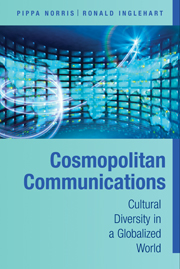Book contents
- Frontmatter
- Contents
- Tables and Figures
- Acknowledgments
- INTRODUCTION
- PART I FIREWALLS
- PART II CONSEQUENCES
- 6 Citizens: National and Cosmopolitan Identities
- 7 Consumers: Economic Values
- 8 Morality: Traditional Values, Sexuality, Gender Equality, and Religiosity
- 9 Activists: Civic Engagement
- CONCLUSIONS
- Technical Appendix A: Concepts and Measures
- Technical Appendix B: List of Countries
- Technical Appendix C: Methods and Multilevel Regression Models
- Notes
- Select Bibliography
- Index
- Titles in the Series
6 - Citizens: National and Cosmopolitan Identities
Published online by Cambridge University Press: 05 June 2012
- Frontmatter
- Contents
- Tables and Figures
- Acknowledgments
- INTRODUCTION
- PART I FIREWALLS
- PART II CONSEQUENCES
- 6 Citizens: National and Cosmopolitan Identities
- 7 Consumers: Economic Values
- 8 Morality: Traditional Values, Sexuality, Gender Equality, and Religiosity
- 9 Activists: Civic Engagement
- CONCLUSIONS
- Technical Appendix A: Concepts and Measures
- Technical Appendix B: List of Countries
- Technical Appendix C: Methods and Multilevel Regression Models
- Notes
- Select Bibliography
- Index
- Titles in the Series
Summary
The second part of this book applies the analytic framework we have developed to test the consequences of the growth of cosmopolitanism communications. Convergence theorists assume that the globalization of the mass media, especially the exposure of traditional developing societies to a barrage of Western entertainment, Hollywood movies, commercial advertising, and international news, has the capacity to transform national identities, social values, and ideas of democracy. One of the most common arguments is that the flow of cross-border information expands awareness about other people and places, so that widespread access to news from abroad may encourage greater understanding, tolerance, and trust of foreigners, while simultaneously weakening national identities and a sense of belonging to local communities. In the social sphere, conservatives fear that images of professional working women depicted in Western media could encourage more egalitarian sex roles in ultratraditional societies, such as Saudi Arabia and Kuwait, challenging conventional views about the appropriate roles of men and women in the home, workforce, and public sphere. Conservatives are also concerned that explicit sexuality in Western advertising, pornographic Web sites, and Hollywood movies could loosen moral standards in traditional societies and bring more tolerant attitudes toward homosexuality, abortion, and divorce. Theorists such as Herbert Schiller, Edward Hermann, and Robert McChesney have long argued that the Western media is the missionary that will spread the values of consumer capitalism around the world.
- Type
- Chapter
- Information
- Cosmopolitan CommunicationsCultural Diversity in a Globalized World, pp. 171 - 198Publisher: Cambridge University PressPrint publication year: 2009



